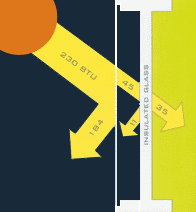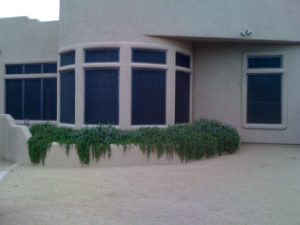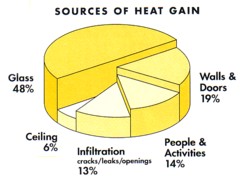Exterior Sun Control
 The most effective way to control the sun’s heat and glare is to stop it before it enters your window. Once the sun’s rays enter they are absorbed and begin to radiate throughout the room in the form of heat. Much like a big shade tree, exterior shading will help reduce your cooling costs, reduce the load on your air conditioning, and will help reduce glare and fading.
The most effective way to control the sun’s heat and glare is to stop it before it enters your window. Once the sun’s rays enter they are absorbed and begin to radiate throughout the room in the form of heat. Much like a big shade tree, exterior shading will help reduce your cooling costs, reduce the load on your air conditioning, and will help reduce glare and fading.
Solar Window Screens

They are called many different things here in “The Valley of the Sun”. But whether you call them Solar Screens, Sun Screens, Window Shade Screens, Exterior Shade Screens, or just “The things on the windows that protect from the sun”, one thing is for certain, They Work Great! Solar Window Screens are the number one item you can add to your home to help reduce the direct and indirect sunlight from heating up the interior of the house. Solar shade screens are an excellent exterior shading product with a thick weave that blocks up to 90 percent of all incoming sunlight before it enters the windows. Solar Screens also add privacy and beauty to your home while in most cases acting as bug screening as well. Because of the reduced heat, you will save money on your utilities and in most cases Sun shades pay for themselves within two years.
Overhangs
Overhangs shade direct sunlight on windows facing within about 30 degrees of south. Overhangs on east and west window are ineffective unless they are as long as the window is high.
What Others Say
“It is far better, for heat gain prevention, to block the sunlight before it reaches the window, thereby dissipating the absorbed heat outside where it can be carried away by the air currents. This means that simple shade trees and other exterior shading methods can be very effective, both in saving air cooling energy and in blocking the strong glare which direct sunlight can produce if allowed inside.”
“If the homeowner is considering window film, it is important to realize that some window manufacturers void their warranties if window films are applied to their products. The main reason is that most window films accomplish their solar glare reduction by absorbing solar radiation inside the film, causing it to heat up. Some of the heat in the film will conduct to the glass on which it is applied, causing this glass to expand. If it expands enough, stresses can build up in the window and cause it to fail, most often through a shattering of the glass.” (Choosing the Best Residential Window Options for the Arizona Climate is VERY important to your Homeowners and other warranties.)
Shading Coefficient
When looking for window treatments that will block out the hot sun, you’ll want to consider the “shading coefficient” of different alternatives. The Shading Coefficient is a measure of the ability of the window treatment to reduce the solar heat gain. The lower the number, the less solar heat will enter your home and the lower your cooling or heating bills will be. For instance, honeycomb cell shades and wood or faux wood blinds are better at energy conservation than roller shades or aluminum blinds. Keep in mind that interior window coverings such as honeycomb shades, wood blinds, and faux wood blinds reduce solar heat most effectively if the surface facing the glass is a reflective color like white.
Solar screens, patio shades and skylight shades mount on the exterior and can be removable, retractable, or stationary. These energy saving shades provide excellent visibility while blocking up to 90% of the heat before it reaches the window surface. Solar screens have many benefits, especially for homeowners wishing to save on their utility bills.
Energy Conservation
Screens Unlimited solar screens save energy…
Screens Unlimited solar screens offer an easy and practical method for improving the energy efficiency of windows and glass doors. In the summer, most unwanted heat gain comes in the form of sunlight radiating through unprotected glass. This glass is a building’s most vulnerable area for heat gain. In fact, 60 square feet of glass can admit as much as 12,000 BTU’s of heat each hour requiring one extra ton of air conditioning (East Facing, 8a.m., Latitude 40° N.). Controlling this solar heat gain is extremely important in energy conservation and passive solar design.
Phifer SunTex is a specially woven exterior solar screen that blocks up to 90 percent of the sun’s heat and glare before it reaches the glass surface.
Sun Control


Solar Screens are the leading choice for sun control among architects, builders, and homeowners. Unlike interior window treatment, like drapes, blinds or even double glazing (which can absorb and then reradiate the sun’s heat), Solar Screens absorb and dissipate up to 90 percent of the UV rays, heat, and glare before it reaches the window.

